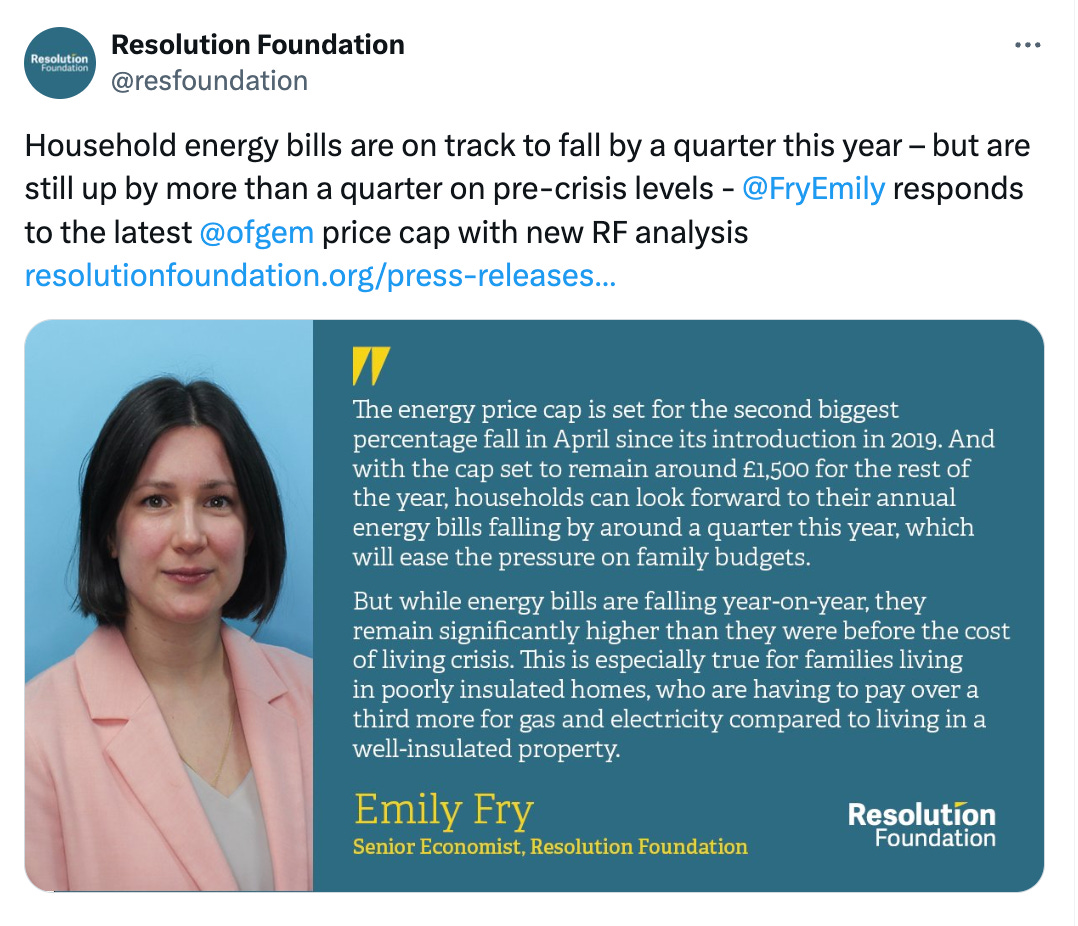Hello and welcome to the latest edition of Off to Lunch…
Household gas and electricity bills should fall to the lowest level in two years after the energy regulator announced a cut to the energy price cap.
Ofgem said this morning that the energy price cap will fall by 12.3 per cent from April 1. This means that a household that pays for electricity and gas by direct debit and uses an average amount of energy will have their bills capped at £1,690 a year, the equivalent of £141 a month. This compares to the current price cap of £1,928 and is the lowest since early 2022.
The drop in the price cap will have a notable impact on inflation in the UK and help to drag it down further from April.
For those who are interested, the table below shows how Ofgem calculates the price cap. The biggest driver in it coming down is a fall in wholesale gas and electricity prices…
The graph below from Simon French, the chief economist at Panmure Gordon, shows how household energy bills have fallen year-on-year. It shows how prices increased sharply in 2022 but are now falling steadily…
Nonetheless, bills are still much higher than they were before the Covid-19 crisis, as Emily Fry at the Resolution Foundation notes below…
Jonathan Brearley, the chief executive of Ofgem, faced questions from the BBC this morning about why some customers will see their prices go up…
You can find more details on energy prices by reading Ofgem’s explanation of the price cap here
The new Business Leader…
The new Business Leader website and magazine have now launched. We are building a new inspirational, aspirational and agenda-setting business publication for the UK. You can read our analysis, interviews and expert columnists on our website by clicking the image below. Our new magazine is on its way to shops and you can subscribe to your own print or digital version by clicking here
Other stories that matter…
1. Jeremy Hunt, the chancellor, is under pressure from fellow Conservative MPs to cut the effective tax rate for parents. The way that child benefits are structured means that parents on middle incomes face an effective tax rate of more than 70 per cent. MPs want Hunt to make changes in the Budget to encourage parents to work, rather than stay at home to save money on childcare. You can read more in a Financial Times story here. The latest fertility data for England and Wales is an interesting follow-up to this column, as the BBC’s Faisal Islam notes below…
2. Mike Ashley’s Frasers Group now owns an 8.9 per cent stake in Hornby, the model train maker, and is the third largest shareholder. Story from CityAM here
3. Having meetings wastes time and company money, according to Harry Wallop in his latest column for The Times. Research has found that scrapping meetings not only saves time but encourages employees to make faster decisions. “Let’s be clear: some meetings are useful and some — especially the occasional cross-departmental ones — are crucial for fostering a sense of camaraderie in an organisation,” the column says. “But many are a waste of time and most are too long.” You can read the piece in full here
4. The secret to finding good ideas is to think about the worst. That is what author Tim Harford says. “When looking for a business breakthrough, a design innovation or a flash of artistic insight, it can be hard to think of much when challenged to dream up a good idea,” he writes in a column. “Far easier, less intimidating and more fun to write down a list of terrible ideas, then see what those terrible ideas suggest once you turn them on their heads.” You can read the piece in full here
5. The Economist has looked at the story behind Costco, the third biggest retailer in the world behind Walmart and Amazon, and why it is so popular with customers, staff and investors. Costco has an “arrogantly simple” business model says Richard Galanti, the chief financial officer. You can read the piece in full here. For more on Costco I recommend listening to Acquired’s podcast episode on the history of the company…
Podcast…
The latest episode of our Business Leader podcast looks at the story behind how Simon Arora and his brothers Bobby and Robin turned B&M from a small discount chain in the north of England into one of the biggest retailers in the UK. In part one, we speak to Simon Arora about how he found B&M, the strategy behind building the business, and how it nearly all ended after less than a year.
You can listen to the episode via Substack here, Spotify here or Apple here
And finally…
The 17-year-old darts sensation Luke Littler has given what I think is his first big interview to Martin Samuel at The Times. It’s a fascinating insight into how someone becomes a prodigy. Malcolm Gladwell’s theory on the 10,000-hour rule comes to mind, which is actually referenced by Simon Arora in our latest podcast episode. This is what Samuel writes in the piece:
So how do you get to be as good at darts as Littler? The same way you get to Carnegie Hall in the old joke. Practise, practise. During lockdown he did nothing else. There is an app called Scolia that records the scores of darts players at home and 13-year-old Littler’s numbers were so good some in the community thought he was cheating. “I was doing four, five hours a day, every day,” he recalls. “Nothing else to do. Started getting into different computer bots.”
You can read the full piece here
Thanks for reading. If you enjoy Off to Lunch then please share it with others and spread the word. If this newsletter was shared with you then please sign-up below to get Off to Lunch sent directly to your inbox
Best
Graham












